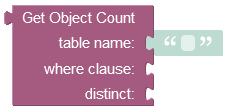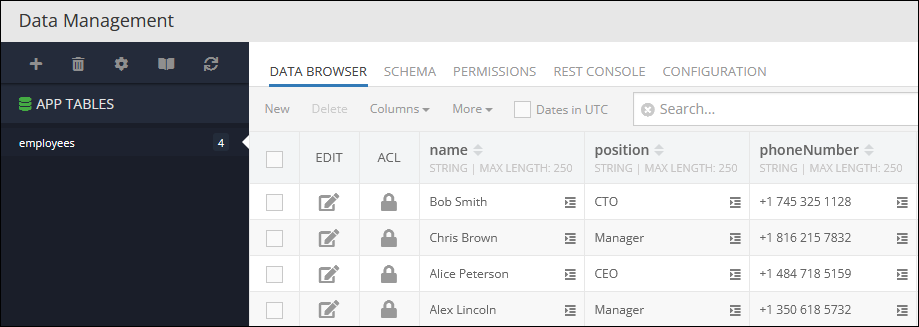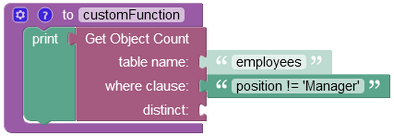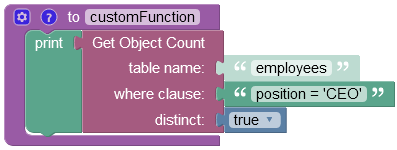Get Object Count¶
The Object Count API provides a way to obtain the following values from the server:
- Number of objects in a table
- Number of objects matching query
- Number of related objects
// Get total object count for the "TABLE-NAME" table
Backendless.Data.of( "TABLE-NAME" ).getObjectCount()
.then( function( count ) {
})
.catch( function( error ) {
});
// Get object count for the objects matching the
// query from the "TABLE-NAME" table
Backendless.Data.of( "TABLE-NAME" ).getObjectCount( queryBuilder )
.then( function( count ) {
})
.catch( function( error ) {
});
// define constructor function. Instances of the DataTypeX class
// will be stored in the "DataTypeX" table
function DataTypeX() {
// define class properties here
}
// Get total object count for the "DataTypeX" table
Backendless.Data.of( DataTypeX ).getObjectCount()
.then( function( count ) {
})
.catch( function( error ) {
});
// Get object count for the objects matching the query from
// the "DataTypeX" table
Backendless.Data.of( DataTypeX ).getObjectCount( queryBuilder )
.then( function( count ) {
})
.catch( function( error ) {
});
where:
| Argument | Description |
|---|---|
DataTypeX |
name of the table where object count should be calculated. |
"TABLE-NAME" |
name of the table where object count should be calculated. |
queryBuilder |
instance of Backendless.DataQueryBuilder. With the "object count" API, the class can used only to set the "whereClause" as shown below:DataQueryBuilder.create().setWhereClause( whereClauseValue ); |
Return Value¶
Returns the number of objects in the data table optionally matching the provided query.
Example¶
Total object count for a table:
The following sample request retrieves total number of objects in table Order:
Backendless.Data.of( "Order" ).getObjectCount()
.then( function( count ) {
console.log( "total objects in the Order table - " + count );
})
.catch( function( error ) {
console.log( "error - " + error.message );
});
function Order {
// define the properties of the Order class here
}
Backendless.Data.of( Order ).getObjectCount()
.then( function( count ) {
console.log( "total objects in the Order table - " + count );
})
.catch( function( error ) {
console.log( "error - " + error.message );
});
Object count for a query:
The following sample request retrieves total number of objects in table Order which satisfy the condition of orderAmount > 100:
var queryBuilder = DataQueryBuilder.create().setWhereClause( "orderAmount > 100" );
Backendless.Data.of( "Order" ).getObjectCount( queryBuilder )
.then( function( count ) {
console.log( "found objects matching query in the Order table - " + count );
})
.catch( function( error ) {
console.log( "error - " + error.message );
});
function Order {
// properties of the Order class are defined here
}
var queryBuilder = DataQueryBuilder.create().setWhereClause( "orderAmount > 100" );
Backendless.Data.of( Order ).getObjectCount( queryBuilder )
.then( function( count ) {
console.log( "found objects matching query in the Order table - " + count );
})
.catch( function( error ) {
console.log( "error - " + error.message );
});
Related object count:
The following sample request retrieves total number of related "child" objects for a parent object. The parent table is Person. It contains a relation column called address pointing to the Addresstable. The query below retrieves a count of related child objects for a parent object with objectID of XXXX-XXXX-XXXX-XXXX. The whereClause query syntax for this scenario is:Person[address].objectId = 'XXXX-XXXX-XXXX-XXXX'
Notice the API request is sent to Address (the child table):
var queryBuilder = DataQueryBuilder.create();
queryBuilder.setWhereClause( "Person[address].objectId = 'XXXX-XXXX-XXXX-XXXX'" );
Backendless.Data.of( "Address" ).getObjectCount( queryBuilder )
.then( function( count ) {
console.log( "found child objects for the parent - " + count );
})
.catch( function( error ) {
console.log( "error - " + error.message );
});
function Address {
// properties of the Address class go here
}
var queryBuilder = DataQueryBuilder.create();
queryBuilder.setWhereClause( "Person[address].objectId = 'XXXX-XXXX-XXXX-XXXX'" );
Backendless.Data.of( Address ).getObjectCount( queryBuilder )
.then( function( count ) {
console.log( "found child objects for the parent " + count );
})
.catch( function( error ) {
console.log( "error - " + error.message );
});
Codeless Reference¶

where:
| Argument | Description |
|---|---|
table name |
Name of the data table where to calculate the object count. |
where clause |
Optional argument. If set, it is a search query used by the server it to determine the number of objects matching the condition. Refer to the Search With The Where Clause topic for more information. |
distinct |
Used to return unique objects from the data table. Only custom properties/columns are considered in the query. Hence, if the data table contains a duplicate object, then it is not counted in the operation. |
Returns the number of objects in a table (if the where clause is not set), otherwise the number of objects matching the search query.
Consider the following records in the employees data table:

The example below counts specific objects in the data table since the where clause condition is set to exclude objects that contain the value 'Manager' in the column position. Thereby, objects with the 'Manager' values in the position column are not counted in the operation.

The result of this operation will look as shown below after the Codeless logic runs:

Consider the data table below that contains two duplicate objects:

The Codeless logic below has a where clause condition which is set to include in the operation only those objects that contain the value 'CEO' in the position column. The distinct parameter is set to true, hence the operation is set to count only unique objects, duplicates are skipped.

The result of this operation will look as shown below after the Codeless logic runs:
